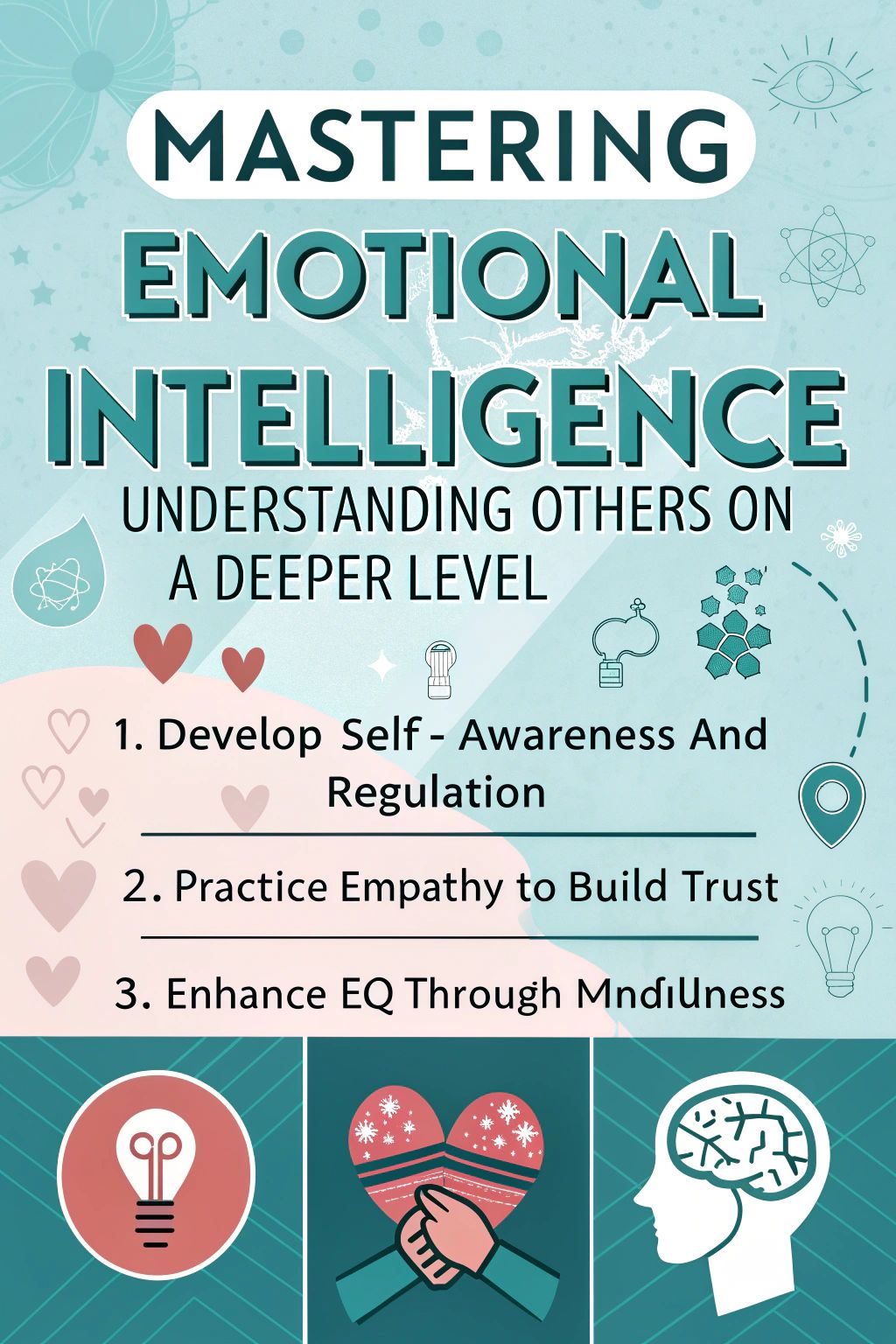Many individuals find making profound connections with others challenging. They may grapple with comprehending the emotions of others or knowing the right response in social interactions.
This understanding shortfall can lead to misunderstanding, exasperation and tense relationships. The importance of emotional intelligence in interpersonal interactions shouldn’t be understated.
One aspect of emotional intelligence (EQ) is that it extends beyond self-emotion management—it involves recognising and influencing others’ emotions as well. This article will serve as a guide to enhance your EQ prowess.
The discussion includes mindfulness practices, active listening skills, and the potential benefits of training programs.
Such techniques will provide guidance on better emotional control and enhancing interpersonal relationships. Continue reading for insightful information on becoming more emotionally intelligent.

What is Emotional Intelligence (EQ)?

Emotional Intelligence, also known as Emotional Quotient (EQ), is the capacity to comprehend, apply, and regulate your emotions in positive manners. It’s a critical factor for effective communication, overcoming obstacles, and resolving conflicts.
Studies indicate that 90% of high performers display exceptional EQ. Differing from IQ, which gauges cognitive capacities, EQ measures your adeptness at identifying and grasping emotions within yourself and others.
This proficiency goes beyond merely experiencing emotions; it extends to activities such as discerning others’ feelings and managing relationships tactfully and empathetically. Heightened emotional intelligence is instrumental in realising success in both personal and professional domains.
It provides leaders with the capacity to understand their teams better by appreciating their needs and inspirations.
Core Components of Emotional Intelligence
Emotional intelligence involves self-awareness, self-regulation, motivation, empathy, and social skills. Recognising and understanding emotions in oneself and others is vital for building strong relationships and effective communication. These components form the foundation of emotional intelligence and play an essential role in personal and professional success.
Self-awareness
Self-awareness implies recognising how emotions shape actions and decisions. It includes an understanding of both personal strengths and areas needing improvement. This skill is fundamental for anyone aspiring to be emotionally intelligent.
For instance, 79% of high-ranking executives acknowledge having blind spots in their self-perception. Identifying these blind spots aids leaders in better team management.
Individuals with heightened self-awareness can sense their emotions at any given moment. They comprehend the reasons behind these feelings too. This understanding enables them to manage their responses, enhancing their effectiveness in demanding situations or while making challenging choices.
It forms the underpinning for other emotional intelligence skills such as empathy and social skills, vital for cultivating robust relationships and effective leadership.
Self-regulation
Self-regulation involves mastering control over your reactions and emotions. It means you can handle impulse feelings well and keep your emotions in healthy balance. This skill helps you manage stress effectively, making it easier to stay calm under pressure.
People with good self-regulation can make better decisions because they are not overwhelmed by their immediate feelings or desires.
Improving self-regulation is key for leadership development and mental health. Leaders need this ability to maintain cool heads while making thoughtful decisions that affect others.
Techniques like mindfulness practices help individuals gain better control of their emotional responses, enhancing their capability to navigate challenging situations successfully.
Motivation
Motivation is a prime element of emotional intelligence. It aids individuals in setting and accomplishing goals. This zeal originates from within and propels individuals to better themselves and attain triumph.
In numerous corporations, chiefs utilise motivation to enhance team spirit and output. For example, 85% of Fortune 500 corporations utilise feedback universally to galvanise their workforce.
This illustrates how imperative motivation is in both personal advancement and organisational ethos.
To be motivated implies possessing the enthusiasm to pursue your aspirations without surrendering. It encompasses confronting obstacles with a sunny disposition. Illustrious leaders utilise inherent motivation to inspire their crews towards mutual objectives, augmenting both individual and team execution.
Emotional intelligence training schemes often instruct how to efficiently utilise this internal vitality, thereby allowing anyone to become more self-motivated and robust amidst strain or impediments.
Empathy
Empathy shines as the premier leadership attribute, research by DDI asserts. It enables leaders to improve by over 40% in fundamental fields such as mentoring and planning. This ability assists them in connecting with others on an intimate basis, appreciating people’s sentiments and experiences.
Leaders displaying empathy can arrive at decisions that take into account their team’s emotions, leading to a more inspired and united group.
Despite its significance, 92% of employees sense empathy is undervalued in their workplace. However, 96% concur it’s vital for establishing trust and robust relationships within collectives.
Empathy allows leaders to identify and regulate emotional states effectively. It plays an instrumental part in amplifying communication skills and settling disputes agreeably. By dedicating time to understand others’ viewpoints, empathetic leaders foster an atmosphere where everyone feels acknowledged and appreciated.
Social Skills
Social skills are essential for interpreting emotional cues and navigating group dynamics. They enable people to discriminate between friend and foe, thereby enhancing relationship quality.
Effective social skills pave the way for stronger connections with others, trust building, and effective conflict management. These capabilities enable individuals to interact more effectively and cooperate well with various personalities both in personal and professional environments.
The enhancement of your social skills hinges on the practice of empathy and active listening. This implies attentively listening to others’ utterances without interruptions and striving to view situations from their standpoint.
Given robust social skills, leaders have the ability to foster teamwork and establish a setting where each team member feels appreciated. This results in heightened morale among employees or team members, facilitating groups to accomplish their objectives with increased efficiency.
Importance of Emotional Intelligence in Relationships
Emotional intelligence is vital in relationships, improving communication and nurturing stronger bonds between individuals. It supports conflict resolution and enables individuals to effectively understand and manage each other’s feelings.
Enhances communication
Mastering emotional intelligence boosts your ability to communicate effectively. This skill lets you understand and express thoughts and feelings more clearly. With high emotional intelligence, people use their awareness of emotions to guide what they say.
They choose words that reduce misunderstandings and increase clarity.
Empathetic leaders, who score highly in emotional intelligence, show over 40% improvement in coaching, planning, and decision-making. This is because they listen actively and respond with sensitivity to others’ feelings.
Such leaders can turn a simple conversation into an opportunity for stronger connections within their teams or organisations. Their knack for reading body language and picking up on nonverbal cues improves messages sent and received.
Better communication leads to organisational success as team members feel understood and valued.
Builds stronger bonds
Understanding emotional intelligence is vital in building stronger bonds with others. High emotional intelligence enhances communication and empathy, allowing individuals to connect with others on a deeper level.
This leads to improved relationships, both personally and professionally. Studies have shown that individuals with high EQ are better equipped to recognise and understand others’ feelings, which can help them navigate social interactions more effectively.
By harnessing emotional intelligence, individuals can build trust and create stronger connections with those around them, ultimately leading to more fulfilling and meaningful relationships.
Furthermore, emotional intelligence plays a pivotal role in fostering teamwork and collaboration within various settings such as the workplace or community groups. It enables individuals to manage conflict constructively and empathise with team members, thus contributing to a more cohesive environment where everyone feels understood and valued.
Essentially, by honing their emotional intelligence skills, individuals can significantly improve their ability to form strong bonds with others while also enhancing their overall well-being.
Facilitates conflict resolution
Emotional intelligence plays a pivotal role in facilitating conflict resolution. Understanding and managing emotions effectively can lead to more productive, empathetic, and respectful interactions with others.
By honing emotional intelligence skills such as empathy and self-regulation, individuals can navigate conflicts in a way that builds trust and fosters collaboration. This not only improves the quality of relationships but also promotes a healthier work or personal environment.
In fact, research has shown that teams led by emotionally intelligent leaders experience lower levels of unresolved conflict and higher levels of trust and creativity, highlighting the tangible benefits of emotional intelligence in resolving conflicts.
Mastering emotional intelligence enables individuals to recognise their own emotions and those of others, leading to clearer communication during disputes. Studies have indicated that those with high emotional intelligence are able to de-escalate contentious situations effectively by understanding the underlying emotions at play.
Moreover, an emotionally intelligent approach helps in finding constructive solutions rather than allowing disagreements to escalate further. Therefore, nurturing emotional intelligence is an integral aspect of promoting harmony and productivity within any social or organisational setting.
Techniques to Improve Expression of Emotional Intelligence
Enhance your emotional intelligence through straightforward methods like mindfulness practices, attentive listening, and cognitive behavioural therapy. These strategies can assist you in gaining a deeper comprehension and handling of emotions in constructive ways.
For a more profound exploration of this crucial subject, we encourage you to peruse the entire blog to gain a thorough grasp of the importance and real-world uses of emotional intelligence.
Mindfulness practices
Mindfulness practices are crucial for enhancing emotional and social awareness, as well as promoting relaxation. By integrating mindfulness into daily routines, individuals can gain a deeper insight into their emotions and those of others.
Techniques such as meditation and focused breathing enable people to be present in the moment, nurturing empathy and compassion for themselves and others. Mindfulness also empowers individuals to identify potential emotional outbursts, enabling them to manage their emotions positively.
The integration of mindfulness practices provides practical steps towards achieving higher emotional intelligence. Studies have demonstrated that regular mindfulness practice leads to improved emotional regulation, decreased anxiety levels, and enhanced psychological resilience.
Moreover, these practices significantly contribute to one’s capacity to comprehend and handle both personal emotions and those of others effectively.
To sum up, embracing mindfulness practices is essential for fortifying emotional intelligence and cultivating stronger relationships through improved recognition and understanding of emotions.
Active listening
Utilising active listening in everyday interactions helps in building trust and rapport, allowing individuals to express themselves freely and feel genuinely heard and understood. As a result, it helps to foster stronger connections with colleagues at work or family members at home while enhancing overall communication dynamics.
Cognitive Behavioral Therapy (CBT)
Furthermore, CBT provides individuals with tools to manage stress effectively by teaching practical coping strategies such as relaxation techniques, problem-solving skills, and assertiveness training.
It has been shown to be particularly beneficial in enhancing self-awareness and self-regulation – core components of emotional intelligence – by encouraging individuals to recognise the impact of their thoughts on their emotions while providing tangible methods for altering unproductive thinking patterns.
Overall, CBT facilitates the development of emotional intelligence by empowering individuals with the necessary skills to navigate complex emotional states more adeptly while also fostering a deeper understanding of oneself.
Emotional intelligence training programs
Emotional intelligence training programs are crucial for enhancing interpersonal skills and leadership capabilities. These programmes provide practical strategies to enhance emotional awareness, self-regulation, and empathy, enabling individuals to effectively understand and manage their own emotions while also perceiving and responding to others’ feelings.
Through the incorporation of mindfulness practices, active listening, and cognitive-behavioural therapy (CBT), these programmes empower participants to develop a deeper comprehension of human emotions and improve their ability to navigate complex social interactions.
One remarkable study by Gilar-Corbi et al. in 2019 emphasised the effectiveness of emotional intelligence training for senior managers in organisational settings. The findings illustrated that such training significantly enhanced overall leadership competence, promoting better employee morale and fostering a more positive organisational culture.
Additionally, online courses specifically tailored for emotional intelligence development are readily accessible, catering to diverse professional requirements and offering accessible pathways for individuals seeking personal growth in both their work environments and personal relationships.
Applying Emotional Intelligence in Parenting and Child Development
Parenting involves a comprehensive grasp of emotions, both one’s own and those of a child. Applying emotional intelligence in parenting and child development is vital for fostering strong relationships and promoting healthy emotional growth in children.
By recognising and managing their own emotions effectively, parents can create a positive environment where children feel supported in expressing their feelings. Furthermore, empathising with the child’s emotions allows parents to connect on a deeper level, leading to improved communication and trust within the parent-child relationship.
Studies show that integrating social and emotional learning (SEL) programmes into parenting practices positively impacts children’s emotional well-being, enabling them to navigate challenges more effectively as they grow.
Emotional intelligence equips parents with the tools necessary to understand their child’s needs, fears, and joys better. By honing this skillset through self-awareness exercises such as mindfulness practices or cognitive behavioural therapy (CBT), parents can enhance their ability to connect emotionally with their children while creating an environment that supports healthy emotional development.
Moreover, it enables parents to demonstrate effective emotion regulation techniques which are directly observed by children during developmental stages – influencing how they learn to manage their emotions themselves.
Conclusion
Mastering emotional intelligence is crucial for fostering healthy relationships and effective communication. Understanding others on a deeper level enables us to empathise, build stronger connections, and navigate conflicts constructively.
By honing self-awareness, regulating emotions effectively, and practicing active listening, individuals can elevate their emotional intelligence. This not only enriches personal lives but also enhances leadership skills and organisational culture.
With practical techniques and a commitment to continuous improvement, one can cultivate emotional intelligence to achieve success in both professional and personal realms.
MindOwl Founder – My own struggles in life have led me to this path of understanding the human condition. I graduated with a bachelor’s degree in philosophy before completing a master’s degree in psychology at Regent’s University London. I then completed a postgraduate diploma in philosophical counselling before being trained in ACT (Acceptance and commitment therapy).
I’ve spent the last eight years studying the encounter of meditative practices with modern psychology.

